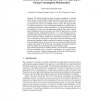Free Online Productivity Tools
i2Speak
i2Symbol
i2OCR
iTex2Img
iWeb2Print
iWeb2Shot
i2Type
iPdf2Split
iPdf2Merge
i2Bopomofo
i2Arabic
i2Style
i2Image
i2PDF
iLatex2Rtf
Sci2ools
SCOPES
2004
Springer
2004
Springer
Combined Data Partitioning and Loop Nest Splitting for Energy Consumption Minimization
For mobile embedded systems, the energy consumption is a limiting factor because of today’s battery capacities. Besides the processor, memory accesses consume a high amount of energy. The use of additional less power hungry memories like caches or scratchpads is thus common. This paper presents a combined approach for energy consumption minimization consisting of two complementary and phase-coupled optimizations, viz. data partitioning and loop nest splitting. In a first step, data partitioning partitions large arrays found in typical embedded software into smaller ones which are placed onto an on-chip scratchpad memory. Although being effective w. r. t. energy dissipation, this optimization adds overhead to the code since the correct part of a partitioned array has to be selected at runtime. Therefore, the control flow is optimized as a second step in our framework. In this phase, loop nests containing if-statements are split using genetic algorithms leading to minimized if-statem...
| Added | 02 Jul 2010 |
| Updated | 02 Jul 2010 |
| Type | Conference |
| Year | 2004 |
| Where | SCOPES |
| Authors | Heiko Falk, Manish Verma |
Comments (0)

